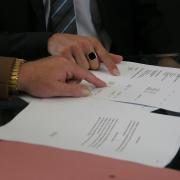
A will is an estate-planning tool that serves as your set of instructions regarding who gets your property and resources when you die. At a minimum, everyone needs a simple will. It is the document that most people use for transferring their property, and it is often the choice of young families and of others whose situations involve neither complex tax planning nor resource management for incapacitated family members. After death, the will is settled through the probate process.
To appreciate the terminology used in a will, select Prepare Your Estate Plan Case Study 4: How Much Will Each Heir Inherit? Remember to access the Financial Security Glossary for an understanding of the terms used.
Why have a will?
- It allows you to decide how to distribute your assets after death.
- It lets your wishes—rather than state law—determine how to distribute your resources to your heirs.
- It allows you to appoint a guardian of your choice for minor children.
- It allows you to name important people (an executor/executrix or personal representative) who will carry out your wishes.
Lesson Contents
III. Power of Attorney: Planning for Incapacity
IV. Property Transfer: Documents and Legal Arrangements
V. A Will: Who Needs One?
- a. What Constitutes a Valid Will?
- b. Types of Wills
- c. Will Kits and Forms
- d. Assets in a Will
- e. Changing a Will
- f. Dying Without a Will
VII. Personal Representative: To Carry Out Your Wishes
VIII. Gifting and Tax Strategies
X. How to Hire and Work with an Attorney
Prepare Your Estate Plan belongs to a series called Legally Secure Your Financial Future. The series also includes information to help you organize important household papers and to communicate your health-care wishes.

